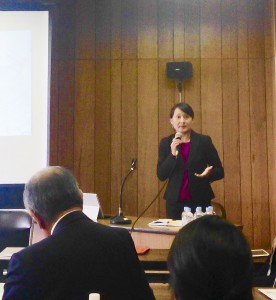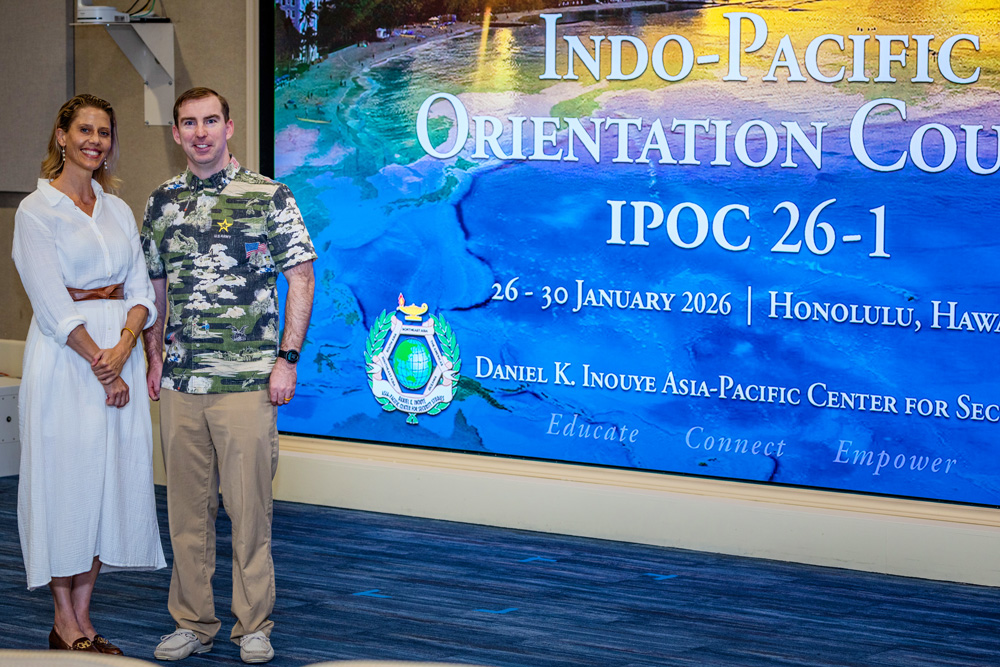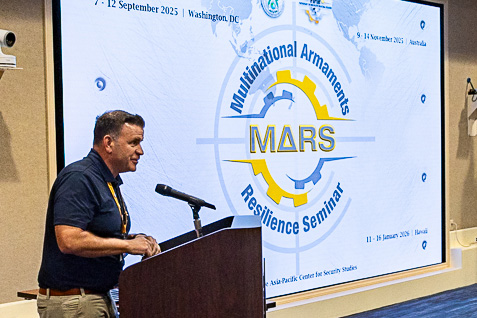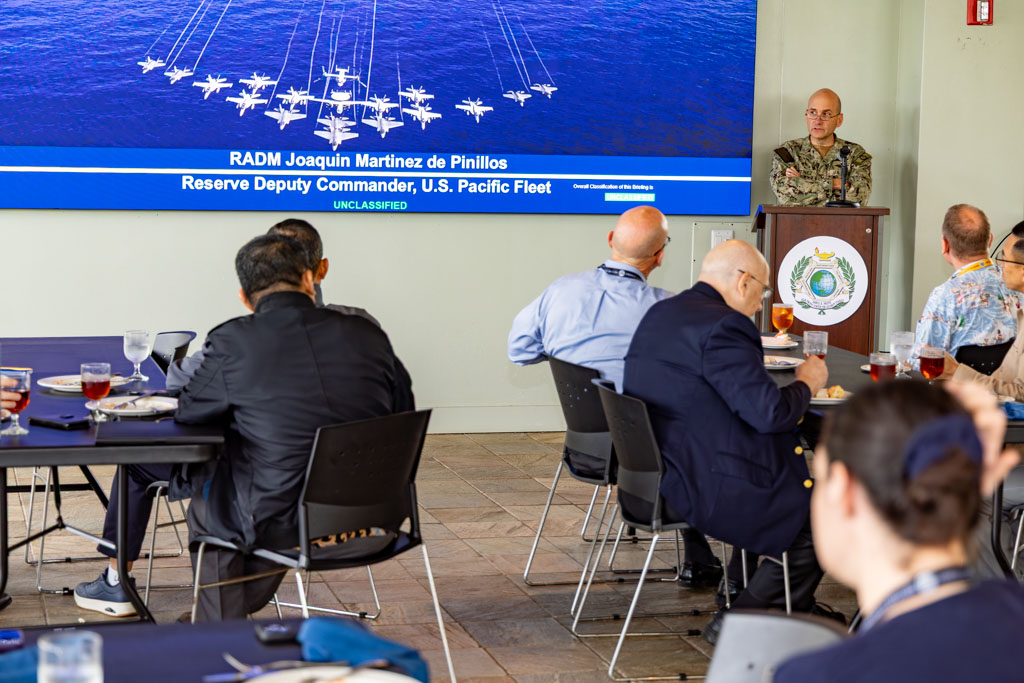 After a workshop is complete there is always a question of what’s next? What will happen with this information? Recently, findings from one workshop were shared at a United Nations World Conference on Disaster Risk Reduction.
After a workshop is complete there is always a question of what’s next? What will happen with this information? Recently, findings from one workshop were shared at a United Nations World Conference on Disaster Risk Reduction.
Associate Professor Jessica Ear represented the Asia-Pacific Center for Security Studies at the Third UN WCDRR March 17 in Sendai, Japan. [1] In a session hosted by R3ADY Asia-Pacific, an APCSS network partner, Ear shared findings from a recent APCSS workshop titled “Building Partnership in South Asia Disaster Risk Reduction.” The workshop was co-hosted by the Sri Lanka Disaster Management Center located in Colombo, Sri Lanka. The event aimed to develop partnership approaches and recommendations in DRR at national and regional levels.[2]
The following is as summary of her presentation:
South Asia, with its densely populated cities, challenging geography and vulnerable infrastructure was described by workshop participants as a high risk, low capacity region. While there is recognition that partnerships include shared risks and shared design as key characteristics, participants agree that currently DRR partnerships occur largely in the response phase of a disaster. This suggests that DRR partnerships are a result of mostly ad-hoc arrangements and are often not considered in planning and integration with other government processes. The social-political landscape of South Asia is such that common challenges related to governance are among the major obstacles to effective DRR partnerships occurrences. Lack of incentive and political will, awareness and trust among differing sectors, human and capacity resources and coordination mechanisms are among governance related issues that all participant countries face. Although policies exist to address disaster risks and reduction, implementation and enforcements of these policies often fall short.
Government participants highlighted the need to engage across ministries to reach beyond the disaster management practitioners to other ministries with authority, resources and accountability of various elements of a national comprehensive DRR plan. Actors such as the private sector and civil society groups can also be valuable partners to reduce disaster risks. To gain their participation governments need to contextualize disaster risk reduction as integral to business core competences and interests. Additionally governments must recognize that community groups should be engaged as they are often long-term implementers of risk reduction and resiliency programs. Participants agree that practicing whole-of-society collaboration will enhance government DRR planning and processes, however it is recognized that more work remains to be done before collaboration is an automatic component of DRR plans let alone DRR partnerships.
Drawing from examples of best practices such as relevant information sharing, technical assistance and utilizing unique strengths of NGOs; the participants identified key opportunity areas for DRR partnerships in the region. Increased DRR awareness, communication and information sharing was prioritized as a large area that has insufficient national and regional capability. This issue was discussed in the context of strengthening existing mechanisms such as the South Asian Disaster Knowledge Network (SDKN), the web portal developed by SAARC.[3] The planned establishment of a regional research center and better leveraging of existing educational institutions for information and knowledge sharing were also discussed. Participants highlighted the need for greater emphasis on disaster impact assessments and early engagement with stakeholders in planning approaches for increased partner buy-in. These opportunity areas for DRR partnership can be supported through disaster risk management strategies and learning that are mainstreamed into a country’s national security studies curriculum. Some discussion points even proposed elevating disaster risk to rank among national security threats in order for their administration to better prioritize DRR efforts and importance.
Among areas for increased DRR partnerships, there was consensus that there is still plenty of room for new ideas to enhance and promote greater DRR partnerships among various actors. The workshop recommendations included strategies to mainstream DRR through national legal framework incorporation, advocacy and partnerships with donors, and the introduction of relevant courses in higher education curricula across multiple disciplines. Each country team recommended a plan of action to address current partnership needs in their respective countries and it was agreed that the group will remain connected on-line to follow up on progress within three months time.
The workshop’s whole-of-society participation and discussion created a relatively free and frank exchange of views across a range of government ministries and actors. It was noted that the dialogue between civil service, defense government representatives and the private sector presented a unique learning and trust building experience for workshop participants. The APCSS workshop on DRR partnership yielded observations consistent with the inputs R3ADY Asia-Pacific provided to the WCDRR Post 2015 DRR Framework process. While the ubiquity of DRR need is clear, recommendations for increased partnerships must recognize each participant country’s unique social-political context and varying legal and governance structures – highlighting the need for more localized and targeted approaches to DRR partnerships.
[1] The WCDRR brought together 187 countries and 6500+ conference participants to agree on a new Post 2015 Framework for DRR for the next 15 years. http://www.wcdrr.org/home
[2] The workshop brought together South Asian defense, civilian government, private sector and civil society leaders from Bangladesh, India, Nepal, Pakistan and Sri Lanka as well as the South Asia Association for Regional Cooperation (SAARC).
[3] The South Asian Disaster Knowledge Network (SADKN) designed and developed by the SAARC Disaster Management Centre, New Delhi. The SADKN web portal serves the common platform for sharing knowledge and information among the multiple stakeholders of the member countries of the South Asian Association for Regional Cooperation (SAARC) on the multi-disciplinary and multi-sectoral issues of disaster risk assessment, risk prevention, mitigation and preparedness and disaster response, relief, recovery and reconstruction. http://www.saarc-sadkn.org/
-END-









Leave A Comment